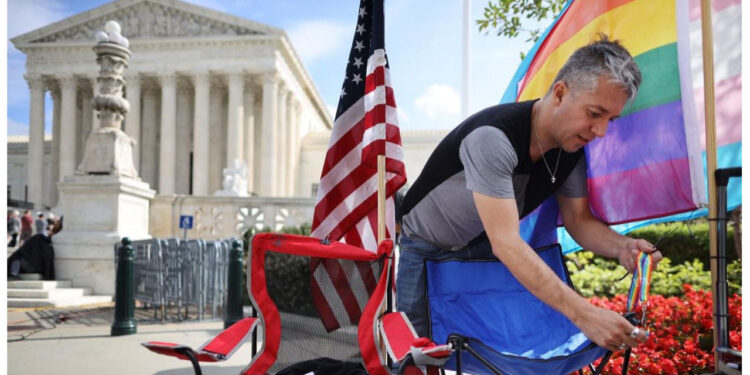Red states are attempting to prevent a federal agency from broadening the legal safeguards for individuals who identify as transgender.
Eighteen states have filed a lawsuit against the Equal Employment Opportunity Commission in federal court in Knoxville, Tennessee. They argue that the federal agency overstepped its authority by issuing legal guidance requiring employers to accommodate transgender workers. This includes using their preferred pronouns and allowing them to use bathrooms that align with their gender identity.
Employers may now be held accountable for workplace harassment under federal anti-discrimination law if they misgender employees by using the wrong pronouns or names, or if they deny access to a bathroom.
The guidance provided by the EEOC serves as a valuable tool for interpreting and addressing harassment claims in the workplace, although it is important to note that it does not hold the same legal weight as a law. As the enforcer of workplace protections, the EEOC’s interpretation of these claims plays a significant role in guiding employers and employees in understanding the boundaries of harassment.
Conservative Backlash Hits Pride: Target Will Not Sell Pride Collection in All Stores
In a move that has sparked controversy, retail giant Target has decided not to sell its Pride collection in all of its stores. The decision comes in the face of a conservative backlash, which has criticized the company for supporting LGBTQ+ rights.
Target’s Pride collection, which includes clothing, accessories, and home decor items, has been a popular offering in previous years. However, this year, the company has chosen to limit the availability of these products, citing concerns over potential pushback from conservative customers.
The decision has drawn criticism from LGBTQ+ advocates and allies, who argue that the move is a step back in the fight for equality. Many have taken to social media to express their disappointment and frustration with Target’s decision.
In response to the backlash, Target released a statement defending their choice, stating that they remain committed to supporting the LGBTQ+ community and that they will continue to sell Pride products in select stores and online. They also emphasized their ongoing efforts to create an inclusive and welcoming shopping experience for all customers.
Despite the controversy, Target’s decision highlights the ongoing challenges faced by companies when it comes to supporting LGBTQ+ rights. Balancing the desire to be inclusive with the potential for backlash can be a delicate tightrope for businesses to navigate. As conversations around LGBTQ+ rights continue to evolve, it remains to be seen how companies will respond and adapt to shifting cultural attitudes.
According to Tennessee Attorney General Jonathan Skrmetti, the EEOC is misusing federal power by attempting to eliminate women’s private spaces and penalize the use of biologically-accurate pronouns. This, in turn, puts Tennessee employers at a disadvantage, as they could face complaints from the EEOC and lawsuits from employees.
In a recent legal update, the EEOC revisited its stance on workplace harassment, specifically addressing transgender discrimination. This revised position by the EEOC is rooted in the 2020 Supreme Court ruling, which recognized that discriminating against gay and transgender employees constitutes illegal sex bias.
The states are arguing in their lawsuit that while federal law protects transgender workers from being fired, it does not mandate employers to provide accommodations for them. They believe that this issue should be addressed and resolved by Congress and the individual states.
According to the lawsuit, the Court ruled that it is considered employment discrimination to fire someone based solely on their sexual orientation or gender identity. The Court’s decision specifically focused on these two aspects and did not address any other workplace activities or employment actions.
States like Alabama, Georgia, Indiana, Missouri, and Ohio were among the participants in the lawsuit.
Last month, a lawsuit was filed challenging an EEOC rule that grants the same legal protections to workers who have had abortions as those given to pregnant workers or workers who have recently given birth.
The EEOC announced in the previous year its intention to revise its legal guidance, which would incorporate sexual orientation and gender identity. This move drew criticism from certain conservative and religious groups who argue that the guidance contradicts state laws.
The significance of this guidance lies in its role as a blueprint for the enforcement of federal anti-discrimination laws by the EEOC. It is noteworthy that the commission had not revised its harassment guidance since 1999.
The EEOC has not responded to a request for comment at this time.
According to EEOC Chair Charlotte Burrows, who was appointed by President Joe Biden, the recently issued EEOC guidance aims to enhance individuals’ awareness of their workplace rights and responsibilities.
In a press release, Burrows emphasized that harassment, whether it occurs in-person or online, continues to be a significant problem in workplaces across America. He highlighted the importance of the Equal Employment Opportunity Commission’s (EEOC) updated guidance on harassment, stating that it is a valuable tool that compiles effective strategies for preventing and addressing harassment while also providing clarity on recent legal advancements.










